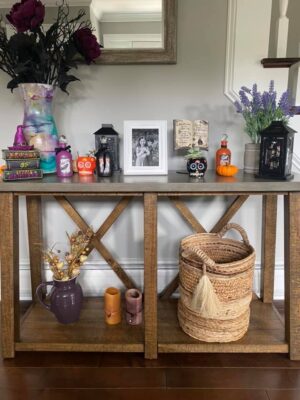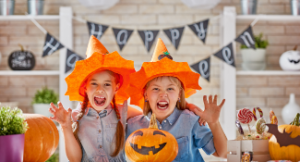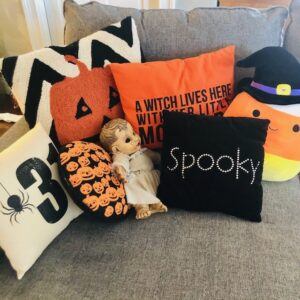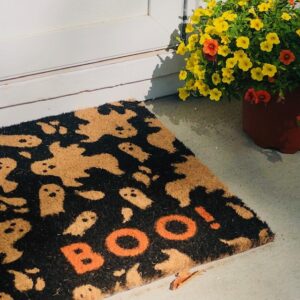Family
Do Jews Celebrate Halloween?
In a typical year, all across the country, neighbors would be preparing their homes for trick-or-treaters and children would be planning their costumes. While some Halloween traditions may look different this year, there is one question that often arises, pandemic or not: Do Jews celebrate Halloween?
Just as with almost any other question asking what Jews do—there isn’t one simple answer, as evidenced by an informal survey of Jews of different ages and backgrounds across the country.
“Yes,” says Lisa Cole Olin of Bethesda, Md., who explains that she doesn’t see the holiday as religious. “I see it just as a community celebration and a fun way to engage with the neighborhood.”

Cara Weber Lyons of Shrewsbury, Mass., agrees. “We have some decorations in our home, I love the colors! We have always done costumes and trick-or-treating and passed out candy. I just see it as a fun activity with friends.”
Shayna Moskowitz of Silver Spring, Md., has a slightly different perspective. “Growing up in Massachusetts, we went trick-or-treating and handed out candy, but never decorated the house or had store-bought costumes,” she says. “Honestly, as the only observant Jewish kid in a public school, I missed out on so many social interactions that were on Shabbat. I am thankful my parents let me participate in Halloween with my friends.”
Moskowitz, who remains an active member of the Conservative movement, says that in any other non-pandemic year, she would be taking her 2 ½- year-old daughter trick-or-treating.
Joanna Dreifus of New York City feels a special connection to Halloween, as she was born on October 31. Her kids—ages 14 and 17— have largely outgrown trick-or-treating, but the family still goes all out on a Halloween-themed birthday celebration. Each year, the home is decorated in throw pillows that say things like, “A witch lives here with her little monsters” and spooky dolls. Dreifus even changes over her shower curtain and places a ghost-adorned doormat out front.
In contrast, Meira Schneider-Atik of Queens, N.Y., says she has never celebrated the holiday. Schneider-Atik, whose children are 11, 14 and 16, says that Halloween is “celebrated in a way that’s all about gimme gimme gimme.” Judaism, she believes, is about giving, not taking. And she prefers to focus on the Jewish holidays, including Purim, which is often referred to as the Jewish Halloween because of the costumes and sweets. However, on Purim, Jews deliver mishloach manot, baskets of treats, to friends and neighbors. They don’t go around asking strangers for candy, she notes.
Adam Shain of Sharon, Mass., says that his family does not celebrate Halloween because it’s a religious Christian holiday. “I know people who go to mass,” he explains. Shain, who is Orthodox, says that they turn off the lights in the house and don’t participate at all.

“It’s not Jewish and not a straight American holiday (like Thanksgiving). It has pagan origins and doesn’t feel right to celebrate,” agrees Beth Kraus, the New York City mom of three young children who identifies as Modern Orthodox.
So, which is it: Christian, pagan or American?
According to History.com, Halloween originated with the Celtic festival of Samhain, which took place 2,000 years ago in parts of Europe. The pagan festival was celebrated every October 31 with people dressing in costumes to scare off the ghosts they believed would return to Earth with the onset of winter.

In the eighth century, Pope Gregory III established All Saints Day on November 1, and featured many of the pre-existing traditions of Samhain. The evening before was known as All Hallows’ Eve, which eventually became Halloween.
While there may be those who still celebrate the holiday for its pagan roots, and others who take seriously its Christian nature, most people over time began to disregard its origins entirely. Americans generally celebrate the holiday as a fun event focused on costume and candy, decorations and jack-o-lanterns.
Even with the holiday’s Christian and pagan roots, many observant Jews feel there is a middle ground between all-out celebrating and not participating at all.
“In theory, we would give out candy to others who are celebrating,” says Kraus. “But people don’t come by in our building.”
Eliana Rantz of Cincinnati, Ohio, also Modern Orthodox, says she and her husband let their three young kids dress up to hand out candy. “They know we don’t celebrate Halloween, but it makes them happy to hand out candy in costume. They get so excited every time the doorbell rings and a group of kids are there.”
“I tell my kids that we give out candy because it’s always nice to help others celebrate, even if we aren’t celebrating it ourselves,” says Shana Greenfeld Katz of St. Louis, Mo.
Still, despite good intentions, the desire to help neighbors celebrate doesn’t always pan out.
“We buy candy every year, no one comes to the door, and we eat it all,” says Mindy Schaper, of Linden, N.J. With COVID-19 still raging, this could be a common predicament this Halloween.

As towns across the United States emerge from and re-enter quarantines, and lockdown procedures are ever-changing, families and neighborhoods are still trying to determine if Halloween is even going to happen this year. Will kids be allowed to trick-or-treat, and if so, what precautions must they take? Who will be giving out the candy and how will they do it in a way that keeps everyone safe? As giant spider- and skeleton-decorated houses abound in neighborhoods across the country, everyone, it seems, is preparing for the best-case scenario and bracing for the worst.
Do you celebrate Halloween? And if so, how will this year be different from all others?










 Facebook
Facebook Instagram
Instagram Twitter
Twitter
Suzanne Temple says
Most people see Halloween as a secular holiday. Very few even know its roots. Some Christians even call it a pagan festival and ban it! On the other hand, the roots of Christmas are well known. Why question a fun event all kids can participate in…. Yet there is no severe commentary against those Jews who celebrate “ secular(sic)” Christmas.
Mary M Criddle says
I won’t be handing out candy or have my porch light on. The kids are ccute and I will pray they stay safe that night.